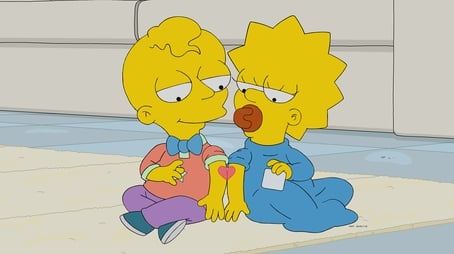
Ask Your Own Question
What is the plot?
The episode begins with Marge and Homer Simpson discussing their plans for the day. Marge is excited about a new parenting book she has read, which emphasizes the importance of nurturing and bonding with babies. Meanwhile, Homer is more focused on his own interests, showing a lack of enthusiasm for the parenting advice. This sets the stage for the contrasting approaches to parenting that will unfold throughout the episode.
As the day progresses, Marge decides to put her newfound parenting knowledge into practice with Maggie, their youngest child. She sets up a series of activities designed to stimulate Maggie's development, including sensory play and bonding exercises. Marge is filled with joy and determination, believing that these activities will help Maggie grow into a well-adjusted child. However, Maggie seems indifferent to the structured activities, preferring to play with her toys in her own way.
Homer, feeling left out of the parenting activities, attempts to bond with Maggie by introducing her to his own interests, such as watching TV and eating snacks. He believes that his laid-back approach will be just as beneficial for Maggie. This leads to a humorous montage of Homer and Maggie engaging in various activities, including watching cartoons and eating donuts, showcasing their carefree bond.
As the episode continues, Marge becomes increasingly frustrated with Homer's lack of involvement in the structured parenting activities. She feels that he is undermining her efforts to raise Maggie in a nurturing environment. This tension escalates when Marge confronts Homer about his parenting style, leading to a heated argument. Homer insists that his way is just as valid, while Marge argues that they need to be on the same page for Maggie's sake.
In a pivotal moment, Marge decides to take a more drastic approach to parenting by enrolling Maggie in a prestigious baby enrichment program. She believes that this program will provide Maggie with the best opportunities for development. Homer is skeptical but ultimately agrees to support Marge's decision, albeit reluctantly. This decision marks a turning point in the episode, as it sets the stage for the challenges that lie ahead.
At the baby enrichment program, Marge is initially thrilled to see Maggie participating in various activities alongside other babies. However, she soon realizes that the program is highly competitive and stressful for both the parents and the children. The pressure to excel begins to take a toll on Marge, who becomes increasingly obsessed with Maggie's performance. Homer, on the other hand, remains laid-back and tries to enjoy the experience without the added stress.
As the competition heats up, Marge's obsession leads her to push Maggie harder, causing tension between mother and daughter. Maggie, feeling overwhelmed, begins to withdraw and express her discomfort. This emotional shift is palpable, as Marge struggles to balance her desire for Maggie to succeed with the need to respect her daughter's feelings. The conflict reaches a climax when Maggie refuses to participate in an important event, leaving Marge devastated.
In a moment of reflection, Marge realizes that her intense focus on achievement has overshadowed the joy of simply being with Maggie. She decides to step back from the competitive environment and reconnect with her daughter on a more personal level. This decision is marked by a heartfelt scene where Marge apologizes to Maggie and expresses her love, emphasizing the importance of their bond over external achievements.
The episode concludes with Marge and Homer finding a balance in their parenting styles. They come together to support Maggie in a way that respects her individuality and preferences. The final scenes depict the family enjoying a simple day at home, filled with laughter and love, highlighting the importance of connection over competition. The episode ends on a warm note, showcasing the growth of both Marge and Homer as parents.
What is the ending?
In the ending of "The Incredible Lightness of Being a Baby," Maggie, after a series of adventures and misadventures, ultimately finds herself in a situation where she must confront her own identity and the challenges of growing up. The episode concludes with Maggie embracing her role as a baby while also showing signs of independence, leaving the family with a sense of hope and continuity.
As the episode draws to a close, we see Maggie in a moment of reflection. She is surrounded by her family, who have been through various trials throughout the episode. The emotional weight of the journey is palpable as each character has faced their own struggles, but they come together in a moment of unity. Maggie, with her signature pacifier, looks around at her family, and there is a sense of understanding that while she is still a baby, she is also growing and changing. The scene fades out with a warm, familial embrace, symbolizing the bond that holds them together despite the chaos of life.
Now, let's delve into the ending in a more detailed, chronological narrative.
As the climax of the episode unfolds, Maggie finds herself in a precarious situation after a series of misadventures that have tested her resilience. The scene shifts to the Simpson household, where the family is gathered, visibly worried about Maggie's whereabouts. Homer, Marge, Bart, and Lisa express their concerns, each showcasing their unique personalities and how they relate to Maggie. Homer, in his typical bumbling fashion, tries to lighten the mood with jokes, but the tension is evident.
Meanwhile, Maggie is on a journey of self-discovery, having encountered various characters throughout the episode who have influenced her understanding of what it means to be a baby. She has faced challenges that have made her realize the importance of family and the support they provide. As she navigates through these experiences, there are moments of humor and heart, showcasing her determination and spirit.
In a pivotal scene, Maggie finds herself at a crossroads, where she must decide whether to embrace her babyhood or strive for independence. This moment is filled with emotional weight as she reflects on her family and the love that surrounds her. The animation captures her expressions beautifully, conveying a mix of innocence and wisdom beyond her years.
As the family finally reunites with Maggie, there is a collective sigh of relief. The scene is filled with warmth as they embrace her, and the chaos of the earlier moments fades away. Each family member expresses their love for Maggie in their own way, reinforcing the theme of familial bonds. Marge kneels down to Maggie's level, gently reminding her that it's okay to be a baby and that growing up will come in time.
The episode concludes with a heartwarming montage of the Simpson family together, highlighting their quirks and the love that binds them. Maggie, still clutching her pacifier, looks around at her family with a sense of belonging. The final shot lingers on her face, capturing a moment of contentment and acceptance of her identity as a baby, while also hinting at her future growth.
In this ending, each character finds resolution in their own arcs. Homer learns to appreciate the chaos of family life, Marge reinforces her nurturing role, Bart and Lisa show their protective instincts towards Maggie, and Maggie herself embraces her identity while looking forward to the future. The episode closes on a hopeful note, emphasizing the importance of family and the journey of growing up.
Is there a post-credit scene?
In the episode "The Incredible Lightness of Being a Baby," there is indeed a post-credit scene. After the main story concludes, the scene shifts to a whimsical moment featuring Maggie, the youngest Simpson child.
In this brief scene, Maggie is seen in a playful setting, surrounded by a colorful array of toys. She is happily playing with a large, inflatable ball, which she pushes and rolls around with glee. The camera captures her innocent joy, showcasing her wide-eyed wonder as she interacts with the ball, which bounces around the room.
As the scene progresses, the focus shifts to a nearby television, where a news report is being broadcast. The news anchor discusses the latest happenings in Springfield, but Maggie's attention remains solely on her playful antics. The juxtaposition of the serious news with Maggie's carefree playfulness highlights the innocence of childhood amidst the chaos of adult life.
The scene concludes with Maggie giving a cheeky smile to the camera, a moment that encapsulates her character's charm and the lighthearted spirit of the show. This post-credit moment serves as a delightful reminder of the simplicity and joy found in being a child, leaving viewers with a warm feeling as the episode wraps up.
What motivates Lisa to take care of Maggie in this episode?
In this episode, Lisa is motivated by a desire to bond with her baby sister, Maggie, and to prove her capability as a caretaker. She feels a sense of responsibility and wants to show that she can be a nurturing figure, especially as she grapples with her own identity and the challenges of growing up.
How does Marge react to Lisa's new role as Maggie's caretaker?
Marge initially feels proud of Lisa for stepping up to take care of Maggie, but she also expresses concern about the pressures Lisa is putting on herself. Marge tries to support Lisa while also reminding her that being a caretaker is a big responsibility and that she should not neglect her own needs.
What challenges does Lisa face while caring for Maggie?
Lisa faces several challenges while caring for Maggie, including managing Maggie's unpredictable behavior, balancing her own schoolwork, and dealing with the expectations placed on her by her family. These challenges lead to moments of frustration and self-doubt, highlighting the difficulties of taking on adult responsibilities at a young age.
How does Bart's attitude towards Maggie change throughout the episode?
Initially, Bart is indifferent and somewhat dismissive of Maggie, viewing her as a nuisance. However, as he observes Lisa's dedication and the bond that develops between Lisa and Maggie, Bart begins to appreciate Maggie more. This shift in attitude culminates in a moment where he shows a protective instinct towards her, indicating growth in his character.
What role does Homer play in the family dynamics during this episode?
Homer plays a comedic yet supportive role in the family dynamics. He often provides comic relief with his bumbling antics, but he also offers moments of wisdom, encouraging Lisa and Bart to appreciate their roles as siblings. His interactions with Marge and the kids highlight the chaotic yet loving nature of the Simpson family.
Is this family friendly?
In "The Incredible Lightness of Being a Baby," there are a few scenes and themes that may be considered potentially objectionable or upsetting for children or sensitive viewers:
-
Baby's Perspective: The episode explores the world from a baby's point of view, which may include moments of confusion or distress as the baby navigates adult interactions and environments.
-
Parental Anxiety: There are scenes depicting parental worries and fears about raising a child, which could resonate with viewers who have experienced similar feelings.
-
Physical Comedy: The episode features physical humor that may involve mild slapstick or chaotic situations, which could be startling for younger viewers.
-
Emotional Moments: There are emotional scenes that touch on themes of growth, change, and the challenges of parenting, which might evoke strong feelings.
-
Mature Themes: Some underlying themes related to responsibility and the pressures of adulthood may be more complex and could be difficult for younger audiences to fully grasp.
Overall, while the episode maintains the show's comedic tone, these elements may require parental guidance for younger viewers.











